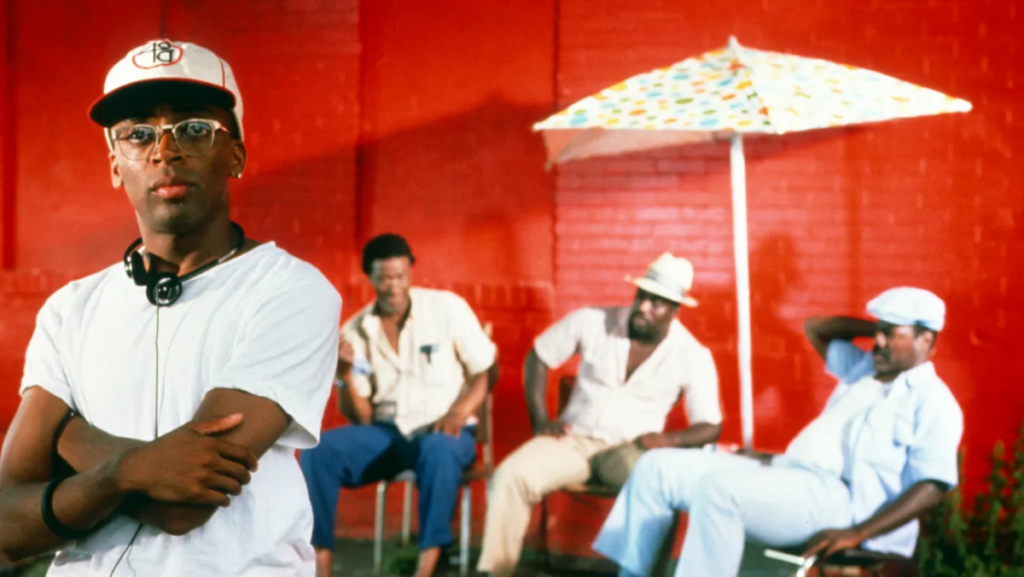
https://www.filmcomment.com/article/interview-spike-lee
Spike Lee’s Do The Right Thing is a powerful film that explores the depths of humanity’s moral ambiguity, and this interview only further illuminated Lee’s intentions and key themes communicated in his film. Lee’s philosophy on using film as a vehicle for social reflection is really interesting to read about, and although the film is 35 years old, it’s remarkable how little this country’s political and racial landscape has changed. I literally did a double take when Lee comments on Donald Trump’s hypocrisy at calling out black-on-white crimes yet silence at the numerous examples of violence directed towards black people… it is almost mind boggling to think about how a movie so steeped in aesthetics from another era is remarkably homogeneous with today, down to the fact that the racism that Lee is commenting on is now consolidated into another Trump presidency.
At various points in the interview, it feels like Lee is almost arguing with the journalist on the political readings of the film. Lee maintains that the point of the film is not in who is right and wrong. Every single character has moments of good entrenched in the bad. It’s easy to assign moral scores to characters because that’s what we do as audience members, we need to attach to someone we can relate to and view in a positive light. But Lee points out that even his character, Mookie, is not really a great person. He cares more about getting paid than his girlfriend and child. One of the most fascinating things Lee said in the interview was his discussion on how white critics view Mookie’s action of throwing the garbage can into the pizzeria. A lot of the white establishment in Hollywood initially saw his character as one of the “nice” black people, until he incited violence. That sentiment is still relevant today, where we see black people in society having to somehow prove themselves as good people to receive the same rights as anyone else. Lee also argues that the juxtaposition between the quotes from MLK Jr and Malcolm X are not meant to be ambiguous. Lee says: “Well , I don’t think it’s ambiguous. I think you really have to concentrate on what the final coda of the film is: the Malcolm X quote, not the Martin Luther King quote.” This really made me think about what exactly the ideology of Do The Right Thing is. If what we are supposed to take away is the quote about violence in self-defense is intelligence, then why did Lee include the quote about non-violence from MLK? Could it be that Lee believes both can be true at once? And if so, why does Lee say that the inclusion of the contrasting quotes are not meant to be ambiguous? These are questions I don’t have answers to, but are interesting to think about. Overall, I loved Do The Right Thing and reading about the ideological thought behind the film only works to enhance my enjoyment of it.
Do The Right Thing is a film that stays with you because it refuses to give easy answers. After reading the interview you pasted with Spike Lee, I’m struck by how intentional he was in creating characters who challenge us.
Mookie is a complex character, neither entirely good nor bad, reflecting the nuanced portrayal of every character in the film. His decision to throw the garbage can raises deeper questions about what it truly means to “do the right thing” and challenges the simplistic idea around being a “good person.” The film left the audience to reflect on the likely consequences if he hadn’t acted, and most likely, nothing would have changed. Yet, that inaction wouldn’t have been the “right” choice either.
Mookie’s actions challenge viewers to reflect on how society often denies Black people the freedom to be fully human—flawed, angry, complicated—without being villainized. His decision to throw the garbage can isn’t an act of senseless violence but a response to the systemic issues. Lee uses this moment to expose the unfair weight of expectations placed on marginalized groups and the complexity of their choices in a world that offers no simple solutions.
Lee says the film closes on Malcolm X’s quote about self-defense being intelligence, but the inclusion of MLK’s words about nonviolence invites the audience to consider both almost conflicting ideologies. I think the film is saying that life is nuanced and there are moments where standing up for yourself, forcefully, if needed, is the only way to survive. The film doesn’t tell you which path is “right” but instead forces you to sit with these conflicting ideas.